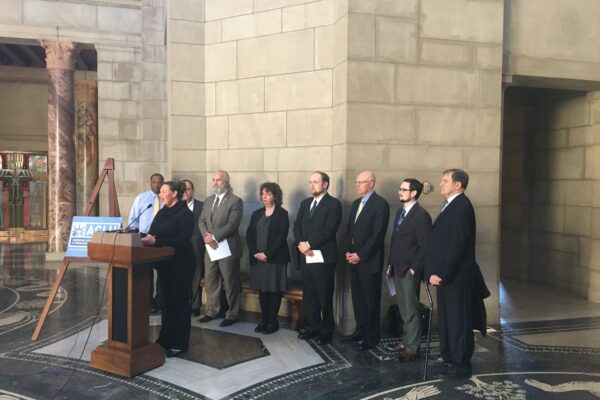LINCOLN, Neb— Today a diverse group of state and national organizations convened in favor of civil forfeiture reforms introduced in the Nebraska Legislature by Senator Tommy Garrett and an impressive list of cosponsors. Civil asset forfeiture is a legal mechanism that allows law enforcement to take and keep an individual's private property it claims may be connected to illegal activity without charging the property owner with a crime. According to an investigation from the ACLU of Nebraska in October of 2015, Nebraska law enforcement used federal asset forfeiture programs to seize over $16 million from 2010-2014. The two bills, LB 1106 and 1108, are set for public hearing in front of the Legislature’s Judiciary Committee today.
Danielle Conrad, Executive Director, ACLU of Nebraska
For 50 years, the ACLU of Nebraska has defended the individual rights and liberties of all Nebraskans. Right now, civil forfeiture in our state exists without meaningful checks and balances to ensure fairness for individuals battling to recover their private property that is ensnared within a system that is stacked in favor of the government. There is no question that civil forfeiture originated with legitimate public safety purposes in mind but our research clearly illustrates that private property is too often seized without any evidence that it has been used in connection with a crime. Nebraska is not alone in exploring these much needed reforms and in fact similar successful bipartisan efforts in other states have provided a sound model for these bills. We thank Senator Garrett and his co-sponsors for their leadership and are excited about the diverse outpouring of support already amassed in favor of these bills, ensuring a strong chance for meaningful reform to be adopted this session.
Gavin Geis, Executive Director, Common Cause Nebraska, 402-710-0583, ggeis@commoncause.org
Common Cause Nebraska supports LB1108 and Senator Garrett’s efforts to shine light on the archaic process of civil forfeiture in Nebraska. It’s a sad state of affairs when even the Auditor doesn’t know how much is being seized by our law enforcement agencies. Moreover, without transparency a number of lingering questions will always remain: How large is civil forfeiture’s role in footing the bill for law enforcement? Are there racial and economic disparities at play in the seizure process that require greater scrutiny? It’s time we open the process of civil forfeiture for all Nebraskans to examine and hold to the phrase carved over our Capitol’s entrance, “The salvation of the state is watchfulness in the citizen.”
Jesse Hathaway, Managing Editor/Budget & Tax News, The Heartland Institute, cell: 614.769.7828
The Heartland Institute’s mission is to discover, develop, and promote free-market solutions to social and economic problems, and we are very excited to be able to work with the American Civil Liberties Union today.
In Nebraska’s civil forfeiture process, property owners are presumed guilty and their property seized, before being charged with a crime, unless they contest the forfeiture, proving they were not aware their property was being used illegally. Unless an owner actively works to recover his or her property, spending more assets to retrieve their assets, it will be lost forever to the government, through no fault of their own.
The current system, although well-intentioned, is demonstrably broken, and Nebraskans’ rights to private property and due process are being violated. By working together, this diverse coalition will protect the citizens of this state, and make the system fairer and more equitable for all.
Lee McGrath, Legislative Council, Institute for Justice, http://ij.org
The Institute for Justice is the National Law Firm for Liberty. IJ works to limit the size and scope of government power and to ensure that all Americans have the right to control their own destinies as free and responsible members of society.
Since 1991, IJ has come to the aid of individuals who want to do the simple things every American has the right to do—including own property, start and grow a business, speak freely about commerce or politics, and provide their children with a good education—but can’t because they find the government in their way.
No Nebraskan acquitted of a crime in criminal court should lose his property through forfeiture in civil court. That can happen under the current forfeiture law used by law enforcement across the state. State legislators should seize the moment to change the state's forfeiture laws and better secure the property and due process rights of all Nebraskans."
Stay Informed
Sign up to be the first to hear about how to take action.
By completing this form, I agree to receive occasional emails per the terms of the ACLU’s privacy statement.
By completing this form, I agree to receive occasional emails per the terms of the ACLU’s privacy statement.


